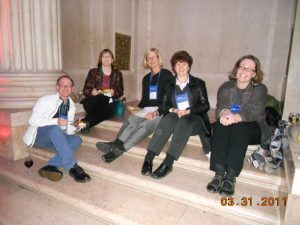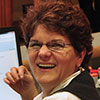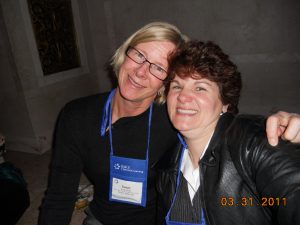This article is more than 5 years old.
I’ve held back my ACRL posting and am doing a single overview of the conference. I know that many people wait anxiously for the posts to start flooding in when several of us go away to a conference, but I didn’t post until now because I wanted to avoid redundancy, reflect on what I’d learned, and wrap it around existing knowledge. I also want to be as succinct as possible so I could share the nuggets and still retain your interest.
I attended several of the sessions on reorganizing and renovating spaces, creating “learning commons” etc, over the course of the conference and I found that:
- no two libraries have done it the same (no two libraries even define “information commons” the same)
- the libraries that are successful have responded to their own users needs
- some of the ideas that were implemented successfully elsewhere wouldn’t work here
- flexibility, technology and outlets are critical
Roz, Susan and I not only took a particular interest in this thread of sessions but we also spent much time after sessions figuring out how we might make use of our crazy space limitations in ZSR to maximize our service and provide a really great experience for our users. We will be looking at what was done at other institutions, (Emory, Georgia Tech, and University of Michigan) and coming back to our users with some questions on what THEY would like to see here. I particularly liked UofM’s approach of giving scenarios to their architects based on what their students said they’d like to see and how they’d like to use collaborative space and technology in the library. Using the scenarios, the architect rendered drawings to incorporate the ideas of the students that went beyond “comfy couches and lots of outlets.” Roz and I discussed the difficulties of getting our students into focus groups and thought that maybe some random Thursday evening we’d show up with 20 pizzas and use the PA to announce, “give us 15 minutes so we can ask some questions, share your thoughts about how you do, or how you’d like to, use the library. We have pizza.”
Surveys and focus groups were a second theme I saw at ACRL. The need to ask and have good information about what our users want is important, especially when the stakes are so high and the funding for renovation comes along so seldom. I volunteered to be a room monitor for a session of three contributed papers that highlighted the uncertainty that comes from acting on what we think we know. The first paper entitled Talkin’ bout my Generalization picked away at accepted generational differences, (ex: millennials are more able to adapt to change, boomers are more conservative, etc) and found that they did not bear out in their survey and that generational differences are not as dramatic as one would expect. The second, Millennial Librarians: Who they are and how they are different from the rest of us noted that millennial librarians (as with millennials in general) tend to have a great deal in common with the GI generation (ie: a great sense of civic duty), but that they also have very great expectations with regards to desiring instant gratification and little concern over privacy issues, and that is bearing out in the workforce as well. The third paper Scary, Exciting or Something In-Between published results of surveys of Ontario’s University and College librarians and their attitudes toward institutional change. Institutional change in the case of these libraries was brought about because of severe budget cuts so the attitudes of respondents tended to be cynical. The survey touched a nerve. The responses indicated that streamlined business models were favored over service and that there was a lack of transparency in the decisions being made. All of the surveys found some surprising results, which again bears out my belief that we should never determine a course of action to better service based on observation, or observation alone.
The third theme that I saw in the conference was one of an increasing digital divide. In fact, there isn’t really one digital divide, but several. We at ZSR are lucky enough to be working for an institution that values it’s libraries and funds them in staffing and technology appropriately. Talking with others at other institutions found this to be not universally true, and we are exceedingly lucky not to have to make do with cut backs others are finding routine. A second digital divide was seen in the struggles that libraries are undertaking to provide access to ebooks. Our users want them, the publishers will (sometimes reluctantly) provide licensing for them, librarians find it difficult to make the switch from owning content to licensing it. The switch from owning a physical copy to a digitally licensed one also assumes that users will always have a device on which to read it. Unsettling for some public libraries, less so for us, but still its’ there. ANOTHER digital divide that I saw in many ways was the reliance on smart phones for delivering and receiving content. QR codes, while understandable to anyone, are lost to anyone who has a cell phone that only calls or texts, (like yours truly.) Using Giz’ tether with his smart phone on the drive up to Philadelphia many times more productive than the ride back on Saturday. What we used to call “toys” are now recognizable as game changers, and not games at all.
And lastly, worthy of note is the fact that I learned as much from my colleagues at this conference as I did from the conference itself. Molly gave me a deeper understanding of her SC work and the Road Show. She also taught me the importance of packing just the right accessories for evening events. Giz showed the value of having the proper tools to maximize efficiency. (He had the right accessories, too.) Roz showed me how to work the vendor floor, and how to push back gently to make it clear when our needs are not met. Susan showed the value of a good head clearing walk, a collaborative lunch, a succinct blog post, and ending with a good photo. 


2 Comments on ‘MB’s ACRL wrapup’
Great post, Mary Beth. I would be particularly interested in talking with you about doing survey and focus groups in ZSR, and the topic of generational differences with regards to “in the workplace” and millenial librarians.
Good post Mary Beth- and…..I know a boomer who isn’t conservative! 🙂